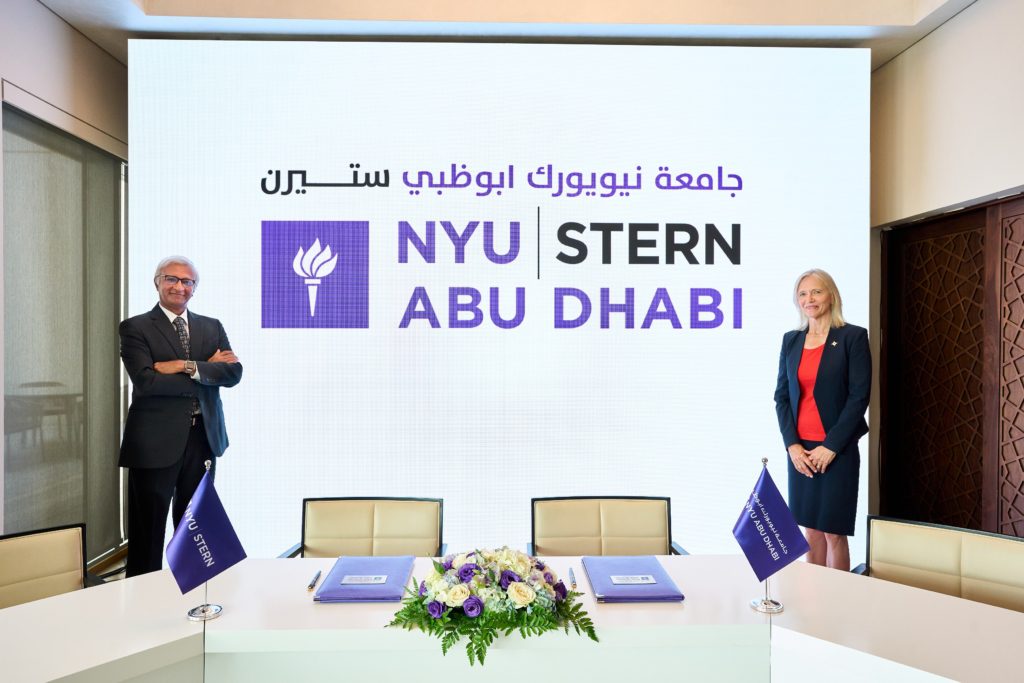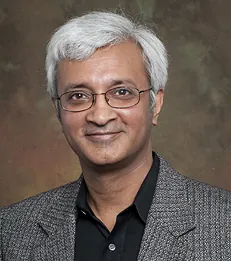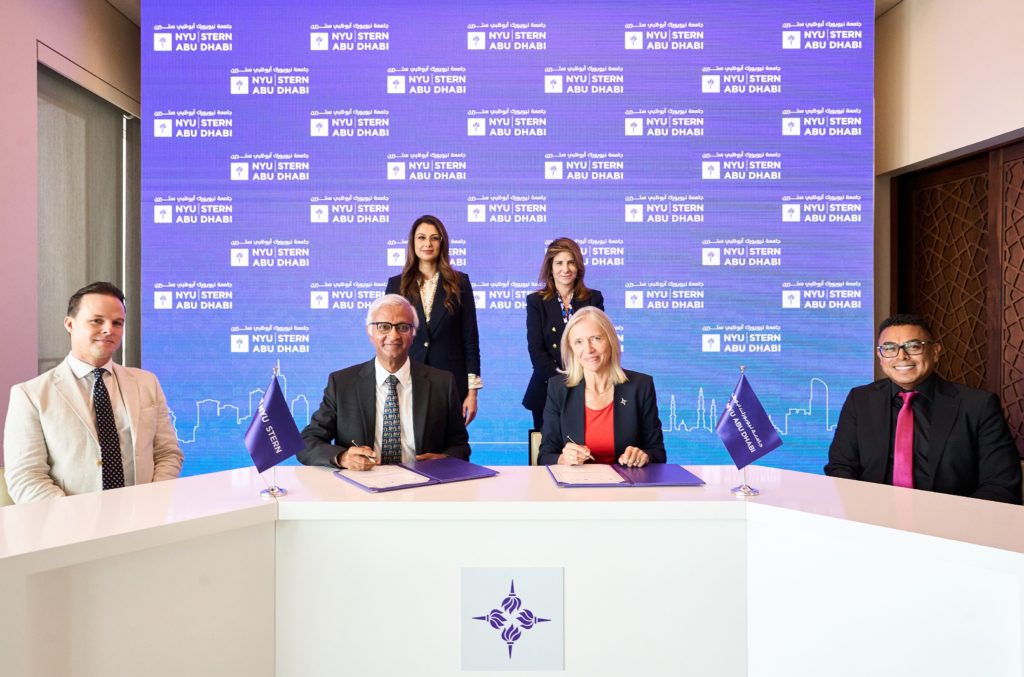
Raghu Sundaram, dean of NYU’s Stern School of Business, poses with Mariët Westermann, Vice Chancellor of NYU Abu Dhabi. NYU Stern and NYUAD will launch a one-year MBA program in Abu Dhabi in 2025. Courtesy photos
New York University’s Stern School of Business is adding to its portfolio one-year MBA programs, announcing today a unique partnership with NYU Abu Dhabi to launch a new joint MBA in 2025.
The Stern at NYUAD One-year Full-time MBA Program, based in Abu Dhabi in United Arab Emirates, will make Stern the only top-ranked U.S. business school to offer a full-time MBA program in the Middle East. Applications will open in October, with the first application deadline on January 15, 2024. The first cohort begins in January 2025, and graduates will earn a fully accredited NYU degree that will be jointly conferred by Stern and NYU Abu Dhabi.
The new one-year degree will have 54 credits, compared to Stern’s two-year program at 60 credits. It will integrate experiential internship projects into the curriculum while providing hands-on learning with companies and organizations based in the Middle East/North Africa (MENA) region.
FIRST DEGREE OFFERING FOR NYUAD
Students will take spring and fall modules in Abu Dhabi and summer modules in New York City, giving students the chance to live and immerse themselves into two important business communities. The mission is to develop a pipeline of young professionals who want to build their careers in MENA region.
“The establishment of the Stern at NYUAD MBA is truly a landmark occasion. The launch of this program — NYUAD’s first professional degree offering, created in collaboration with NYU’s Stern School — is an important new stage in NYU Abu Dhabi’s successful development, and a major step forward in fulfilling the vision that NYU and our Abu Dhabi partners have had for this groundbreaking institution from the beginning,” NYU President Linda G. Mills says.
“It is also a wonderful example of the type of cross-school collaboration that we can expect to see more of in the coming years, and I have no doubt its impact will be felt both regionally and globally.”
NEW PROGRAM ‘MARKS A PIVOTAL MOMENT FOR EDUCATION IN THE UAE’

NYU Stern’s Robert Salomon
Robert Salomon, professor of management at Stern since 2005, will lead the program and will be the inaugural dean of Stern at NYUAD. Salomon is an award-winning scholar who has been teaching global strategy for more than 25 years.
NYU Stern already offers two one-year accelerated MBA programs, both geared to specific industries: Its Fashion & Luxury MBA and the Andre Koo Tech MBA. Its NYUAD offering will be more general, but will have areas of interest to the MENA region built into the curriculum.
“The partnership between NYU Stern School of Business and NYU Abu Dhabi marks a pivotal moment for education in the UAE, with far-reaching implications. As NYU Abu Dhabi remains committed to breaking new ground in global education, this collaboration is a remarkable milestone in our relentless pursuit of excellence, distinction, and service to society in the UAE and many other countries around the world,” says Mariët Westermann, NYUAD vice chancellor.
“The Stern School’s presence at NYUAD will help fuel the knowledge economy in this dynamic crossroads region, respond to the surging demand for global business leaders, and the opportunity to take international business education to the next level.”
Poets&Quants sat down with Raghu Sundaram, dean of NYU Stern School of Business, ahead of the announcement to learn more about this pioneering one-year MBA in Abu Dhabi. The conversation has been edited for length and clarity.
What is the significance in the MENA region, both in an economic sense and to NYU Stern?

Raghu Sundaram, dean of NYU Stern School of Business
The UAE (United Arab Emirates) in particular has, for at least a couple of decades now, become a very, very important business and finance center. It is increasingly the gateway to not just the Middle East and North Africa, but even to the rest of the African continent which I think is a huge factor for us. Historically, the UAE has always had Dubai which has always had very close trade connections with South Asia and other parts of the Middle East, but more recently, with Europe and North America. It’s now becoming more and more important in its own right as a business center, but also as a gateway into parts of the world that we think are going to be enormously important in the coming decades.
It’s lovely to be able to establish a physical footprint for Stern here in what is going to be an important region of economic activity. NYU having established a very strong presence here already gives us that local partner that is absolutely essential for long term viability of a program like this.
Will this be Stern’s first partnership with NYU Abu Dhabi (NYUAD)?
NYU is by far the most global university in the world today. There’s nothing coming even close. We have two full campuses: One in Abu Dhabi and one in Shanghai, but we also have smaller campuses spread around the world from Buenos Aires, Accra, and Sydney to several cities in Europe including London, Madrid, Florence, Berlin, Prague, and Paris. So, Stern has participated in many of these locations in different ways already.
For example, we have an executive MBA program in the Washington DC campus of NYU. We have four joint MS programs with NYU Shanghai – two of which were launched in 2019, the other two last year. In our undergraduate program, we have an option where you can begin your undergraduate in NYU London. Our undergraduate students study abroad in Florence, London, Madrid, and other places. And we often conduct executive modules of programs in Shanghai, in Abu Dhabi, and elsewhere.
Stern has taken full advantage of the global network already, but this is, in a sense, our most ambitious step for a full MBA program. The MBA is our flagship program, and 90% of our graduate students are MBA students of one sort or the other.
I know it’s early in the process, but do you see this as possibly a first step in setting up other MBA programs or professional degrees in some of these other locations?
Regarding NYUAD itself, yes, we would very much like to expand it to other programs at NYUAD. The MBA is certainly the first program we are launching out here, but over time, we will be looking at other programs: executive programs, maybe part time programs, maybe master’s programs. All of these are potential programs we are thinking about, but right now our attention is completely focused on making sure the MBA program is launched.
Why did you launch a one-year MBA first instead of your flagship two-year MBA?
We had considerable discussion internally on the one- versus two-year options. Generally, an integral part of the two-year is the internship, and we’ve thought a long time about the popularity of the one-ear model outside the U.S. But cost is also a major factor. The two-year MBA is significantly more expensive in terms of not just money, but time – two years away from the job market.
Weighing the pros and cons, we finally decided to go in favor of a one-year model. Given the popularity of the one-year model, particularly in Asia and particularly with the younger generation, we thought it might be a more attractive proposition.
Even as one-year models go, it’s a completely unique model because it is, to my knowledge, the only full-time MBA that is actually located in two completely different parts of the globe and in two very important business centers: The UAE on the one hand, and New York City on the other. For full-time MBA students to get a fully immersive, semester-long experience living in – not just visiting for a week or having a short experience – in two different parts of the globe, I think will be a key distinguishing factor in this program.
This one-year degree is 54 credits, just a bit less than Stern’s two-year flagship MBA. So, besides the time of completion, what are the major differences and similarities?
Stern has MBAs in many flavors, as do many universities, although we have them in more flavors than anyone else. We do have the flagship, two-year full-time MBA program, but we also have a very large and important part-time MBA program. We have two executive MBA programs. We’ve also pioneered two specialized one-year programs in New York that were aimed at very specific industries: One in technology and entrepreneurship, the other in the fashion, luxury retail markets.
This one is an MBA program that shares common context with all of them. The MBA ultimately, is meant to serve two primary purposes: one is to demystify the language of business and the other is to instill both the skills and the confidence needed to become business leaders. All our MBA programs are targeted at, essentially, those two aspects.
Our one-year MBA programs are essentially compressed versions of the two-year program – instead of four semesters you have three, but you also take advantage of the gaps between the semesters to have intensives and so on. It’s a very intensive program, giving you the full experience of the MBA within a 12-month period.
Tell us about the experiential projects and learning this new one-year program will offer.
For several years now at Stern, we’ve focused on experiential learning as being a component of our programs. Experiential learning, to me, is really case studies brought into the 21st Century. Traditional case studies are very, very important. I don’t want to minimize the importance of those. But these are what I call live case studies where a company presents you with a live problem, and you’re solving it in real time. All the ambiguity, all the uncertainty, all the lack of information that process involves is, to us, where the rubber hits the road, where all the theory and concepts you’ve learned are put into practice.
So at Stern, we have an office called Stern Solutions that actually opens these projects from companies. Last year, I think something like 650 different MBA students took at least one such course. In our full-time MBA, it’s an elective course that you can choose to do, but hundreds of them actually do it.
In our one-year MBA programs, it is mandatory because there’s no internship. This is how you get to meet companies and how companies get to meet you. We find it valuable in many different ways. It is, in one sense, a substitute for the internship because you’re getting to do work with a company on a specific project.
In the context of this particular program, although we will not make anything public for a while longer, we have reached out to many companies and obtained very enthusiastic responses about wanting to participate. This includes both local companies that are global giants, and it includes global companies which are located in the UAE – finance companies, tech companies, consulting companies. So we’ve reached out to both sets of companies and we’ve had tremendously enthusiastic responses, not just participating in it but partnering with us.
Stern’s other one-year programs are geared toward specific industries, tech and entrepreneurship as well as fashion and luxury. Will this be similarly geared to a specific industry, or will it be more general?
It is more general. It doesn’t have a specific focus, but there are certain areas that are of particular importance to the UAE and broader MENA region. So of course, given our traditional strength courses —in finance, leadership, management, technology — those will all be built into the program’s options. But we’re also giving particular attention to issues around sustainability and entrepreneurship. Those are areas that are particularly important to this region. Here we have both governments and other organizations particularly focused on green futures and we’re building that into an integral part of the program.

Front row, left to right: John Tate, CEO, Tamkeen; Raghu Sundaram, dean, NYU Stern School of Business; Mariët Westermann, vice chancellor, NYU Abu Dhabi; Arlie Petters, provost, NYU Abu Dhabi. Back row: Rima Al Mokarrab, trustee, NYU, and chair, Tamkeen; Linda Mills, president, NYU.
What kind of student are you targeting?
Just as our programs at NYU Shanghai were designed for the China and Asian job market, this program is explicitly focused on the job market of the UAE and the local MENA region. It is built for people who would like to begin their careers here. But because all the students we produce ultimately will become leaders of global corporations, there is a global aspect to it necessarily. So I talk about it as leaders of the UAE and MENA region, but also business leaders for the world.
The primary purpose is to develop the talent and business leadership that the MENA region will need over the coming decades. We want to be one of the primary providers of that talent pipeline. But if you look at the UAE, for example, only 10% of its population is actually native Emirati; 90% are immigrants from various parts of the world. It’s already very integrated into the global economy, and we want to continue drawing talent from everywhere in the world to here.
We are interested in talent from the MENA region, from Africa, and from areas in the world that don’t traditionally apply to MBA programs in the US in large numbers. We are hoping to target those also.
How many people do you hope to enroll for the first cohort? Do you expect that to grow over time?
We’re consciously beginning small with a target number of between 40 and 50 students for the first and maybe for the second cohort. We then hope to scale up after that.
How will the Stern faculty be involved in this MBA?
They will be involved in multiple ways. Let me talk first about the New York component and then talk about the Abu Dhabi component.
We are bringing the students to New York for three purposes: One is to introduce them to the New York faculty and for the New York faculty to experience the Abu Dhabi students. The second is to integrate them into the broader Stern alumni population because our other one-year MBA students will be there in the summer. So the idea is to have them take courses alongside our other one-year MBA students. And third is for them to experience New York City which is the most important business city in the world today.
Our faculty are also actively involved in setting up the business faculty in Abu Dhabi. Every one of our departments is involved in hiring the faculty for the Abu Dhabi campus, and we are encouraging our faculty to teach electives in Abu Dhabi and so on. To the maximum extent possible, we’d like there to be plenty of flow between Stern and the faculty we are setting up in Abu Dhabi.
Why do you think it’s important for a business school like Stern, which already has a large global presence, to reach out to people in places outside their traditional recruiting areas?
I think different people have different opinions on this issue, and I think all of them are legitimate. To me, American corporations long ago realized the importance of globalization and establishing physical footprints everywhere from Australia to Argentina. Universities globally have been much more reluctant to do this. So if you want to study at Harvard, you go to Cambridge. If you want to study at Oxford, you go to Oxford. NYU has been a pioneer in establishing campuses around the world, and I really think this is absolutely wonderful.
Higher education often talks about the importance of inclusivity, but you don’t become inclusive by being exclusive. When you take pride in admitting only 3% of the people who apply to you, what you’re doing is being exclusive. So in some sense, I view this as part of NYU’s approach to inclusivity to trying to establish programs and activities elsewhere in the world. That is one aspect of it.
The other aspect of it is offering both our students and global students the opportunity to interact with each other in different forms, not just in New York, for example. And if you look at NYU Abu Dhabi, it is a young university. It was set up 13 years ago, it’s graduated only 10 classes to date. But it’s already established itself in astonishing ways as a tremendous academic institution. Per capita, it has produced more Rhodes Scholars than any other university in the world, I think: 18 Rhodes scholars to date in just 10 classes.
Even more remarkable is that for an institution that takes only 500 students a year and has only about 2,000 students on campus, they come from 125 different countries. Just as UAE’s population itself is very, very global, the student population is very global. It is an extraordinary experience to be able to study here.
To me, NYU’s model of boldly going where no university has gone before is truly wonderful. And Stern is just being a part of that. I think we are by far the most global of NYU’s professional schools in having so many programs across the globe already, and we’re very happy to be the first of NYU’s professional schools to be in both Shanghai and in Abu Dhabi.
MORE INFO: Learn more about the program and admission requirements and deadlines at stern.nyuad.nyu.edu.
DON’T MISS: SUSTAINABILITY MEETS BUSINESS: HEC PARIS & COLUMBIA LAUNCH DOUBLE DEGREE PROGRAM and CHICAGO BOOTH RETURNS TO TOP OF P&Q’S 2023 EXECUTIVE MBA RANKING





Questions about this article? Email us or leave a comment below.